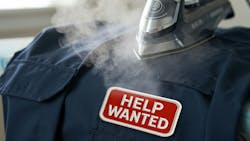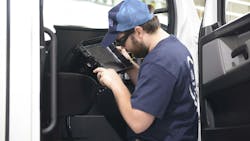How to iron out wrinkles in your hiring process
In this article, you'll learn:
- About the importance of developing an intentional hiring strategy
- How to figure out the qualities you need and want in a candidate based on the job
- When to consider using a recruiter
There’s always going to be repetitive, cyclical chores that shops and technicians need to do for operation, from cleaning and organizing the shop to laundering uniforms. At first glance, hiring new personnel may seem like one of those infinite tasks, as there will always be some amount of churn due to employees moving to a new location, retiring, or parting with the company in some way, shape, or form.
But in today’s business environment, the simple truth is that no shop can afford to put their hiring cycle on rinse-and-repeat — not on a frequent basis, and not when the loss in time and productivity is so significant. New hires cost an average of $5,000, according to recruiting service Boulo. And once on the job, it will take up to five months for them to reach full productivity, according to Growthforce.
Inland Empire Fleet Maintenance, an independent repair shop based in Colton, California, found this to be accurate. According to the shop’s co-owner and account manager, Steve Wilson, it takes about $5,000 to find and hire a tech, then another $10,000 in training and onboarding before they start to turn a profit.
That’s the best-case scenario, since technicians can be a rare commodity. And that doesn’t look like it will improve anytime soon. This year, TechForce Foundation, a non-profit that connects techs to shops, bumped up its auto, diesel, collision, and aviation technician demand projections through 2028. Last year, the same report reduced those projections by 20%. Now readjusted, that’s back up to 971,000 total technicians needed.
This means that in today’s job market, most technicians are quickly snapped up. Depending on your location, it can take a long time to find suitable hires to meet the maintenance demands of the industry. That can slow overall shop growth if the number of trucks to repair grows, but your staff doesn’t.
For those experiencing challenges with finding techs and steep onboarding costs, it may be time to review your hiring process and identify where you can iron out some wrinkles. After all, if you’re emphasizing speed—just finding someone to fill a post—you’ll likely have to do it all over again in a short time, hurting your business overall. And while you’re at it, evaluate how you select and integrate new managers, and for bigger operations, executive-level leaders, who can have a large impact on whether the technicians and service advisors you hire want to stay.
For any and all positions you’re recruiting for, the ultimate goal should be to ensure that the people you find stay on for the long haul. The question is how to do that smoothly without being burnt.
Know who you’re hiring for
When starting the hiring process, the first thing to do is understand what role (or roles) you’re hiring for and what qualities you want to find in an ideal candidate.
For many shops, the ideal technician might not always be who’s the most technically informed (although that helps), as a strong mentorship/apprenticeship can help bring untrained folks up to speed. Shops should also look for people who have good soft skills and are ready to work.
Jane Clark, SVP of operations at NationaLease, noted more shops are focusing on training to build technical skills. “[Then] they can bring people in who aren’t necessarily qualified on day one, but have a great work ethic and desire to learn helping them learn the skills needed,” she said.
When hiring for senior management positions, Debbie Taylor, principal and executive search consultant for Taylor Transportation Search Group, said it isn’t just about what positions a candidate has previously held; it’s about why a company needs to hire someone.
“As a CEO, the first and most important thing is to get into their gut,” Taylor stated. “What are they solving for? By the time you’re talking to a recruiter, you want to have a lot of clarity on what is expected of that person in terms of outcomes,” she advised.
But if a fleet or shop isn’t sure where to start, Taylor also noted that current leadership trends are shifting away from a ‘management by objective’ style. Instead, companies tend to look for leaders who can hold their people accountable while still being involved and engaged with all the people beneath them, someone who knows about their coworkers’ lives and interests. This type of person, she commented, is someone who leads via their influence, instead of through the weight of their position.
“That humble leadership engages the workforce, and you typically won’t see people scrambling away for 25 cents an hour more, because they feel safer, they feel heard,” Taylor said. “They feel there’s opportunity.”
Conversely, she explained that a red flag when hiring upper leadership, such as CEOs, is if someone takes sole credit for their successes. She argued top leadership accomplishments are only achieved through the people beneath them.
“So a huge red flag is someone who is unable to articulate how the people around him or her helped them accomplish their outcomes,” she said.
Should I use a recruiter?
Once a shop or fleet knows what they’re looking for from an applicant, the next step is to figure out where you want to look for your new employee. For busy shops focusing on growing their business and getting vehicles out the door, hiring a recruiter is one option.
Of course, that does come with a cost depending on the position a shop’s looking for. A recruiter may charge between 30-35% for C-suite-level recruits, said Debbie Taylor, principal and executive search consultant for Taylor Transportation Search Group. Technician Find charges $997 per month for the service, as well as a one-time setup fee per location of $497 in the first month. For those prices, daily advertising fees are not included, and the subscription is meant to be paused once a shop’s hired a new technician.
Is that cost worth it? That can vary depending on the position you need, Taylor explained, stating that the cost of having an empty position or having the wrong person in that position can create risk for your customers. This makes the return on using a recruiter much higher.
“If that cost is not the case, maybe you don’t need to hire a recruiter,” Taylor added. “Or maybe you don’t need the position. It’s really a weighing of the benefit versus the investment.”
About the Author

Alex Keenan
Alex Keenan is an Associate Editor for Fleet Maintenance magazine. She has written on a variety of topics for the past several years and recently joined the transportation industry, reviewing content covering technician challenges and breaking industry news. She holds a bachelor's degree in English from Colorado State University in Fort Collins, Colorado.

